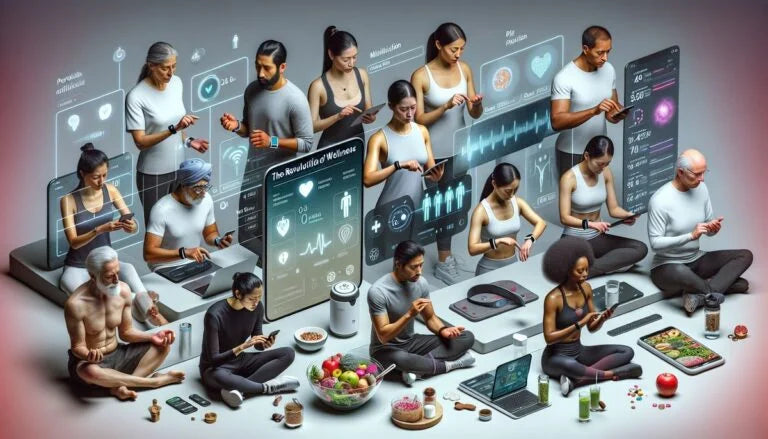
Mental Health Tech: How Apps and Wearables are Supporting Wellbeing
Share
Mental health has become a critical focus in today’s fast-paced world. With an increasing number of individuals struggling with mental health issues like anxiety, depression, and stress, technology is playing a vital role in supporting wellbeing. Through mental health apps and wearable devices, individuals now have tools at their fingertips to monitor, manage, and improve their mental health. In this article, we’ll explore how these technologies are reshaping the way we approach mental wellbeing.
The Role of Mental Health Tech
Mental health technology is evolving rapidly, offering innovative ways to provide accessible support and resources. Apps and wearables have emerged as powerful tools that not only track mental health but also provide real-time insights, coping mechanisms, and therapeutic exercises. They can offer support at any time of the day, making mental health care more accessible, convenient, and personalized.
Mental Health Apps: Providing Therapy and Support
Smartphones are an integral part of daily life, and as a result, mental health apps have become a popular way to manage emotional wellbeing. These apps offer a variety of services, including meditation, mindfulness exercises, mood tracking, cognitive-behavioral therapy (CBT), and even virtual therapy sessions with licensed professionals.
1. Meditation and Mindfulness Apps
One of the most popular ways mental health apps help users is through meditation and mindfulness exercises. Apps like **Headspace** and **Calm** provide guided meditation, breathing exercises, and relaxation techniques designed to reduce stress, anxiety, and improve focus. These tools are particularly effective in helping users unwind and practice mindfulness, which has been shown to improve mental health over time.
2. Mood Tracking and Journaling Apps
Mood tracking apps like **Moodpath** and **Daylio** enable users to record their emotions, thoughts, and daily activities to identify patterns in their mental health. These insights can be valuable in understanding triggers, managing symptoms, and tracking progress. Journaling features help users reflect on their feelings and identify areas that need attention, offering both self-awareness and a sense of control.
3. Cognitive Behavioral Therapy (CBT) Apps
CBT is a widely used therapy that helps individuals challenge negative thoughts and behaviors. Several mental health apps, such as **Woebot** and **Youper**, offer CBT-based exercises and chatbots designed to help users recognize and reframe negative thoughts. These apps use AI to provide users with emotional support, teaching them coping mechanisms and how to better manage their mental health.
4. Virtual Therapy and Counseling Apps
Apps like **BetterHelp** and **Talkspace** have made therapy more accessible by connecting users to licensed therapists via text, video, or voice sessions. This form of teletherapy allows individuals to receive professional support from the comfort of their homes, breaking down barriers related to cost, time, and access to traditional in-person therapy.
Wearable Technology: Monitoring Mental and Physical Health
Wearables have grown beyond fitness tracking, offering solutions that integrate both physical and mental health. Devices such as **Fitbit**, **Apple Watch**, and **Oura Ring** track vital signs such as heart rate variability, sleep quality, and activity levels, which are all indicators of mental wellbeing.
1. Stress Monitoring and Biofeedback
Wearables equipped with sensors can monitor physiological signs of stress, such as changes in heart rate and skin temperature. For example, the **Oura Ring** tracks sleep patterns and heart rate variability, providing insights into stress levels and overall recovery. Biofeedback features help users learn how to regulate their stress response and manage anxiety in real-time by guiding them through breathing exercises and relaxation techniques.
2. Sleep Tracking for Mental Wellbeing
Sleep and mental health are closely intertwined, as poor sleep can contribute to mental health challenges, and mental health issues can disrupt sleep. Wearables like the **Whoop Strap** and **Fitbit** monitor sleep cycles, helping users understand the quality and duration of their sleep. Better sleep hygiene, prompted by insights from these wearables, can have a direct impact on improving mood and reducing symptoms of anxiety and depression.
3. Activity and Exercise Monitoring
Physical activity has long been shown to improve mental health, and wearables help track exercise habits to ensure users are meeting their physical goals. Apps synced with wearables can remind users to get up, move, and stay active, which can be vital for combating depression and maintaining positive mental health. Regular movement releases endorphins, improving mood and boosting mental wellbeing.
4. Real-Time Mental Health Alerts
Some wearables are equipped with features that monitor changes in mood or emotional states and alert the user when their mental health may be in distress. For instance, **Embrace** by **Empatica** is a wristband that uses sensors to detect signs of seizures, stress, or emotional distress in individuals with conditions like epilepsy or autism. These real-time alerts can be crucial for preventing emotional or physical crises and seeking timely support.
Challenges and Considerations
While mental health tech offers tremendous potential, there are challenges and ethical considerations to be mindful of. Data privacy, the accuracy of tracking data, and reliance on technology for mental health care are some of the key concerns. It is important for users to be aware of the limits of these tools and use them as part of a holistic approach to mental wellbeing, including traditional therapy and professional care when necessary.
The Future of Mental Health Tech
The mental health tech landscape is rapidly evolving, with more advanced features and integrations coming to market. AI-powered chatbots, virtual reality therapy, and personalized mental health care plans are just the beginning. As technology advances, we can expect even greater capabilities for users to manage their mental health, access timely support, and live healthier, more balanced lives.
Conclusion
Mental health tech—through apps and wearables—has transformed how individuals manage their emotional wellbeing. From providing meditation exercises and mood tracking to offering virtual therapy and real-time stress monitoring, these technologies have made mental health support more accessible and personalized. While challenges remain, the future of mental health tech holds great promise in improving mental health care, reducing stigma, and empowering individuals to take control of their mental wellbeing.
